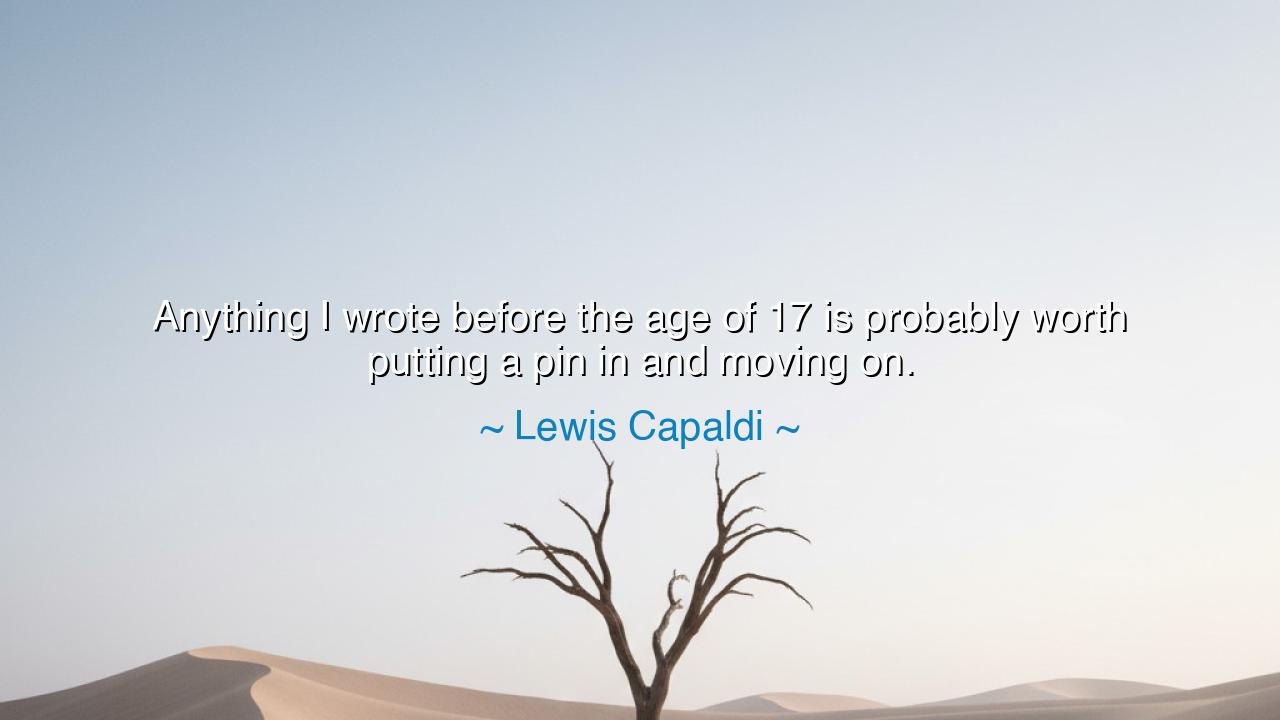
Anything I wrote before the age of 17 is probably worth putting a
Anything I wrote before the age of 17 is probably worth putting a pin in and moving on.






When Lewis Capaldi said, “Anything I wrote before the age of 17 is probably worth putting a pin in and moving on,” he spoke with the humility and self-awareness of an artist who has grown through his own creation. Beneath the humor and casual tone of his words lies a truth as old as art itself — that growth demands letting go, and that the wisdom of maturity often looks back upon the fire of youth with both affection and mercy. His statement is not an act of dismissal, but of understanding: the recognition that every early effort, however flawed, is a necessary step toward mastery.
To “put a pin in it” is not to destroy or deny the past, but to preserve it as one preserves an early sketch — a relic of the journey, valuable not for its perfection, but for the story it tells. In these few words, Capaldi acknowledges the evolution of the self, the way time refines the voice of the artist and teaches the heart to speak with greater honesty. The songs of youth, he implies, belong to a self still forming, a heart still learning its language. To cling too tightly to those early works would be to trap oneself in the echo of what was, rather than embracing the promise of what can still become.
The ancients knew this truth well. Socrates once said that wisdom begins with the acknowledgment of one’s own ignorance. So too does artistic wisdom begin with the recognition that early creation is not the summit, but the first ascent. The young artist, full of passion, creates as one breathes — wildly, instinctively, without measure. The older artist learns to pause, to revise, to question. Yet neither stage is superior to the other. The one gives birth; the other perfects. What Capaldi teaches, then, is the virtue of balance — to honor the flame of one’s beginnings, but not to mistake it for the light of full understanding.
The origin of this quote lies in Capaldi’s reflections on his own music and the process of growth that fame forced upon him. Known for his heartfelt lyrics and unguarded honesty, he has often spoken about the challenges of maturing both as an artist and a person. His humor — the disarming modesty of saying that his early work “isn’t worth much” — conceals a deeper truth: that the act of creation is sacred not because every work is perfect, but because every work leads us closer to who we are meant to become. What he is truly saying is this: do not fear the imperfection of your beginnings; they are the soil from which your greatness will grow.
History, too, offers countless mirrors to this wisdom. Leonardo da Vinci, whose genius shaped the Renaissance, abandoned many of his early sketches and paintings, leaving them incomplete. Yet those unfinished works became stepping stones to masterpieces like The Last Supper and Mona Lisa. Beethoven, too, rewrote his symphonies endlessly, discarding whole movements in pursuit of purity. Their early failures were not waste but foundation — the rough stone from which the sculpture emerged. So it is with Capaldi’s words: to “move on” is not to forget, but to build upon the fragments of one’s own becoming.
There is also a quiet courage in this acknowledgment — the courage to outgrow oneself. Many cling to their youthful creations, afraid that they may never surpass them. But the wise understand that to mature is to change, and to change is to live. Each stage of life demands new songs, new words, new art. Capaldi’s willingness to leave behind his younger voice is a declaration of faith in the future — faith that the best work is not behind, but ahead.
So, what lesson can we take from this? Do not fear the imperfection of your early work. Whether you are a writer, a dreamer, or a builder of any kind, your first efforts are not your failures — they are your foundations. Do not polish them forever; learn from them and move forward. Keep the pin in them as a reminder of who you were, but let your gaze be fixed on who you are becoming. For the world does not need the artist who clings to his youth — it needs the one who dares to evolve, to speak with new depth, and to grow with grace.
Thus, remember this: creation is not a single act but a lifelong unfolding. Every age of your life will give you new music to write, new wisdom to share, new beauty to express. The song of seventeen is not the song of twenty-seven, and that is as it should be. Honor what you have created, but keep moving. For the artist — and the human being — who learns to let go of the past makes room for the masterpiece that still waits in the heart’s future.






AAdministratorAdministrator
Welcome, honored guests. Please leave a comment, we will respond soon